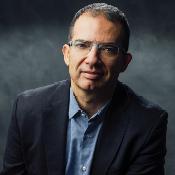
Stéphane Bancel, Albert Bourla, and Alex Gorsky piloted their companies, one a small biotech startup and the others huge multinational pharmaceutical firms, to astonishing triumph in the development and distribution of new vaccines to combat the worst global pandemic in a century.
When the SARS-CoV-2 coronavirus broke out in late 2019, it launched the deadliest pandemic in a century. Crucially, due to decades of creative and diligent research, the scientific foundation for the vaccines that would constitute the main weapon against the virus were already at hand. But even the most effective vaccines cannot quell a raging pandemic if they cannot be quickly manufactured in mass quantities and then widely distributed. Stéphane Bancel, Albert Bourla, and Alex Gorsky are three visionaries whose foresight, energy, and leadership made it possible for COVID-19 vaccines to reach the market on an unprecedented timescale, saving millions of lives.
Vaccines are undoubtedly one of the greatest achievements in science history. From polio to measles to meningitis, vaccines of many types have allowed countless people to evade serious illness and death. But the journey from initial conception to practical application has many stages to ensure safety and efficacy. The development of prior vaccines for infectious diseases has generally taken 8 to 12 years. In the confusing, desperate early days of the COVID-19 pandemic, the best estimates from authorities such as the World Health Organization predicted that at least 18 months would be needed to develop an effective vaccine—an estimate that seemed ambitious at the time. Meanwhile, SARS-CoV-2 continued to spread relentlessly, and its death toll continued to climb.
For Albert Bourla, a former veterinarian, now Chairman and CEO of pharmaceutical giant Pfizer, it was clear that the situation required swift and unprecedented action. He immediately marshaled Pfizer’s vast resources to develop a COVID-19 vaccine and possible treatments, accepting the possibility that it could cost billions of dollars that would not be recouped. The company partnered with German biotech firm BioNTech to focus on an mRNA vaccine platform, despite the fact that no one yet knew whether mRNA vaccines were up to the task, and without any assurance of eventual regulatory approval. Meanwhile, he took steps to ensure that the production of other Pfizer drugs that might be in high demand would not be disrupted and result in dangerous shortages. Bourla also encouraged his scientists to share their data early with the research community to help other companies with their own COVID-19 efforts and struck agreements to use extra Pfizer manufacturing capacity to make vaccines developed by competitors.
Moderna CEO Stéphane Bancel did not have the immense resources of Pfizer immediately on hand when COVID hit, but he had realized the pandemic’s imminent threat in late 2019, even while the virus was still thought to be contained in China. He recognized that his company, which was launched to explore and develop mRNA technology, was perfectly positioned to hit the ground running. Moderna, co-founded by 2016 Benjamin Franklin Medalist Robert Langer, had already conducted clinical trials for nine other mRNA vaccines for influenza and other diseases. Bancel and his management team knew that their first task was to scale their 800-employee startup to meet the development and manufacturing challenge. Quickly, Moderna more than doubled its workforce and forged partnerships with competitors to get the job done. With no guarantee of success and great financial investment, the former bioengineer and pharmaceutical salesperson Bancel was putting his small company at enormous risk.
Like Pfizer, Alex Gorsky's company, Johnson & Johnson (J&J), was a huge and well-established player in the pharmaceutical landscape, and immediately recognized that SARS-CoV-2 posed a major global threat. J&J was able to quickly leverage the adenovector vaccine technology platform the company had been developing for over a decade to combat the transmission of infectious diseases including Ebola and HIV. As a former military officer, J&J Chairman and CEO Gorsky knew the power of uniting behind a shared mission—and the wisdom of taking multiple approaches to fighting a common enemy.
As it happened, both the mRNA vaccines of Pfizer/BioNTech and Moderna and the adenovirus vector strategy of J&J worked better than anyone had hoped. Clinical trials and subsequent studies proved their effectiveness in sharply reducing severe illness and death. Before the end of 2020, less than a year after the genetic sequence of the virus was published, vaccines were going into arms—thanks to the massive investment of resources in the public and private sectors, tens of thousands of volunteers for clinical trials, and accelerated regulatory review. The rapidly spreading virus quickly put the vaccines to the test. Even as the Delta and Omicron variants slowed progress in stopping the pandemic, the vaccines proved to be remarkably robust. Work continues to improve and enhance their efficacy with an eye toward achieving a single vaccine that will defend against any future SARS-CoV-2 variants.
Together, Stéphane Bancel, Albert Bourla, and Alex Gorsky led a risky and ambitious effort comparable to how industries pivoted to wartime production in the 1940s, marshaling the resources of their companies to battle an unexpected global health crisis. Their visionary leadership not only continues to save lives today but sets a new example for innovation and collaboration for the good of humanity in the future.

